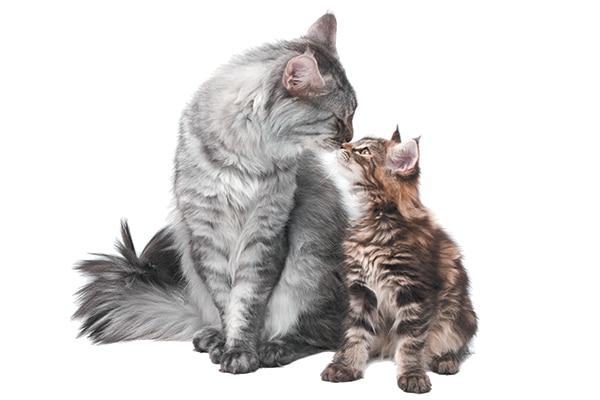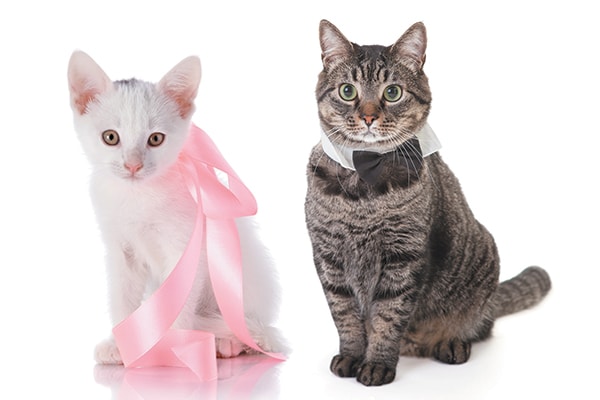You’re entertaining a guest in your home, when your cat casually strolls into the middle of the room, plops down on the floor, lifts up his back leg and begins grooming his, well, private parts. Why would he do something like that and out in plain sight like he wants an audience? And, by the way, this behavior isn’t limited to the male cat population — female cats do it, too. The vast majority of the time, the leg-in-the-air grooming session is simply that — a grooming session. For the most part, cats of all ages are fastidious about grooming themselves, including their genitals and anus. (Although the jury is still out on why they feel the need to do it in front of everyone.) Let’s learn more about what’s normal and what’s not when it comes to cat private parts.
Kittens and Private Parts

Female cats will help clean the rear ends of their young kittens. The mother also wants to stimulate the muscles around the anus to encourage her offspring to have bowel movements. As the kittens continue to grow, they begin to take over the grooming for themselves.
Don’t worry: Your kitten may not take very good care of his private parts at first, particularly if he left the care of his mother at an early age. Help him out by cleaning the area when it needs extra attention.
Be concerned: Sometimes male kittens end up with one or both testicles undescended into the scrotum, a condition called feline cryptorchidism. The testicles should be fully descended by about 2 months of age. If left untreated, cryptorchidism can lead to testicular cancer or a condition called “testicular torsion,” which can be painful. Have your kitten examined by a veterinarian before 6 months of age. Your vet will check for cryptorchidism and, if necessary, will surgically remove the undescended testicle during neuter surgery.
Adult Cats and Private Parts
Sometimes a medical condition can cause adult cats to pay extra attention to their external genitals. In male cats, such parts include the penis, testicles and prepuce (the fold of skin that covers the penis), while a female cat’s external genitals are the vulvar folds.
“There aren’t too many specific ailments involving the external genitals,” says Arnold Plotnick, D.V.M. “Disorders of the prepuce, penis and testicles are rare. Disorders of the female genitalia are uncommon as well.”
With male cats, however, a preoccupation with grooming the penis may indicate a urinary issue. “A urethral plug can form at the tip of the penis, leading to urethral obstruction,” Dr. Plotnick explains. “This is a life-threatening condition in that the obstruction must be relieved so that the cat can be able to urinate.”
Don’t worry: Routine grooming of the genital area is normal for both male and female cats, and sometimes a little extra attention may be necessary.
Be concerned: Repeated, excessive grooming of cat genitals may indicate an obstruction, as Dr. Plotnick notes, or another urinary tract issue in both male and female cats (though feline lower urinary tract disease is more common in male cats). A cat may lick the area to relieve pain, too. Have your cat examined by a veterinarian as soon as possible if you notice excessive genital grooming, which may be accompanied by repeated trips to the litter box with little or no output.
Senior Cats and Private Parts
Less active cats, including seniors, may be more susceptible to weight gain and obesity, which can lead to a medical condition of the female genitalia called vulvar fold pyoderma. “Obese female cats will often develop a deep fold of skin along the sides of the vulva,” Dr. Plotnick says. “The cat’s obesity often prevents proper grooming of that area, and bacteria accumulate in the skin fold, leading to a bacterial skin infection (pyoderma).”
Don’t worry: Keeping the skin around the vulva clean can help prevent pyoderma. Helping your cat lose weight can help prevent the condition, too. “Ideally, the cat should be put on a diet, so the skin fold gets smaller, and the cat can groom better,” Dr. Plotnick explains. In the meantime, your vet can prescribe an antibiotic to treat the infection.
Be concerned: “In rare situations [of vulvar fold pyoderma], surgical removal of the excess skin is required to resolve the problem,” Dr. Plotnick says. Again, helping your cat stay at her healthiest weight will help prevent the situation.
So while your cat’s shameless grooming displays may be embarrassing in front of your guests, they’re usually nothing to cause alarm. If your cat changes his behavior, see your vet as soon as possible. In the meantime, have a good laugh with your entertaining and uninhibited cat.
Thumbnail: Photography by ©eurobanks | Thinkstock (male cat); ©Azaliya | Thinkstock (female cat).
Read more about cat private parts on Catster.com:





